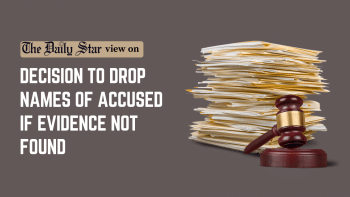Extortion using dubious cases must stop

It is a matter of deep concern that a section of complainants who filed questionable cases after the August 5 political changeover in the country are now extorting money from the accused. According to the DMP commissioner, some of these complainants are now calling the accused and demanding money, promising to remove their names from the cases or withdraw the cases, for which they do not have the authority. Consequently, even though we appreciate the DMP commissioner's honest admission that some police personnel are also involved in this unlawful practice, the practice itself is worrying. The police chief's assurance that action will be taken against those involved in such extortion is appreciable. And we hope to see concrete action taken to address this problem.
After the fall of the Awami League regime, many cases were reportedly filed by family members, neighbours, and activists of different political parties, accusing several thousand people of the killings during the July-August uprising. This daily, on September 22, reported at least six cases where the killings took place in the capital, but most of the accused in the cases were found to be residents of the complainants' home districts and upazilas. For instance, a man named Labhlu Mia was shot dead during protests in Uttara on August 5. A month later, his cousin Dukhu Mia filed a murder case against 221 individuals—mostly local Awami League leaders—who were residents of their hometown, Rangpur. The other cases are also quite similar.
Clearly, these cases were filed for reasons other than seeking justice which, as legal experts have opined, will only weaken the credibility of the charges. Many of the accused have alleged that they were framed with the sole intent of harassing them—and it seems that filing complaints for the purpose of extorting people is also one of the motives in some cases. The question, however, remains: shouldn't the police have been more careful in registering such cases?
We urge the DMP commissioner to take concrete action on this issue. Experts have previously recommended compiling a list of dubious cases and submitting it to the Supreme Court authorities so they can issue the necessary directives in this regard. This should be done without delay. We also expect the home ministry to look into the matter and ensure that innocent people do not suffer from being falsely implicated in cases or subjected to extortion.


 For all latest news, follow The Daily Star's Google News channel.
For all latest news, follow The Daily Star's Google News channel. 









Comments